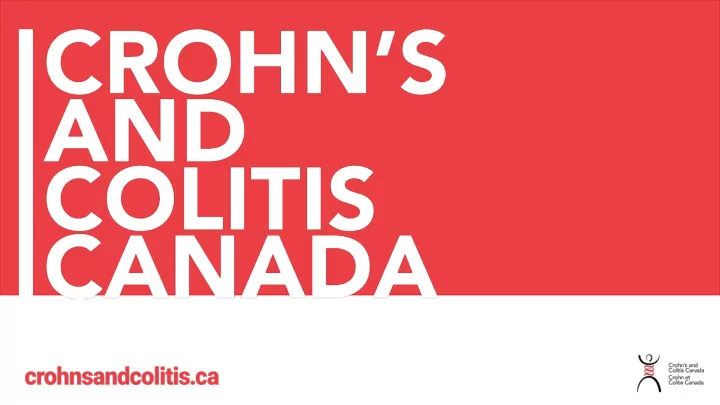

v
2 Background ▪ The only national, volunteer-based charity focused on finding the cures for Crohn’s disease and ulcerative colitis and improving the lives of children and adults affected by these chronic diseases ▪ IBD causes sections of the gastrointestinal tract to become severely inflamed and ulcerated. An abnormal response of the body’s immune system plays a role in the diseases’ pathology. In the absence of cures, current therapies are directed at inducing and maintaining remission. Most people afflicted with IBD require ongoing medication. When this fails, surgeries are often required. ▪ Transforming the lives of people affected by Crohn’s and colitis (the two main forms of inflammatory bowel disease) through research, patient programs, advocacy, and awareness
3 Biologics ▪ The introduction of biologic medications changed the landscape of care for patients living with Crohn’s or colitis ▪ Infliximab’s biosimilars (Inflectra and Renflexis) are approved by Health Canada to treat IBD ▪ In the IBD therapeutic area (Crohn’s disease and ulcerative colitis), there are only 5 biologics, and now, two biosimilars ▪ Relatively low number compared to other immunology diseases (Rheumatology has 10 biologics, and several biosimilars)
4 Our position on biosimilars ▪ We support the introduction of safe and effective treatments for IBD ▪ Patients, in consultation with their doctor, must be able to select the treatment option best suited to each patient’s individual circumstances without undue interference from government or private payers ▪ Patients in remission being treated with an innovator biologic should not be forced to switch to a biosimilar by any government or private payer without the informed consent of the patient in consultation with their physician
5 NOR-SWITCH Trial (2017) ▪ Each patient is already stable on originator biologic for 6 months. ▪ Half of all patients are switched, half are not. Study continues for 12 months to monitor patient symptoms (disease worsening) of no switch vs switch. Difference in Biologic Biosimilar Disease disease worsening (n=202) (n=206) in stable vs switch 14 worsen 23 worsen -14.3% Crohn’s disease (21.2%) (36.5%) Ulcerative colitis 3 (9.1%) 5 (11.9%) -2.6% There weren’t enough IBD participants for gastroenterologists Spondyloarthritis 17 (39.5%) 14 (33.3%) 6.3% (-14.5%–27.2%) to have full confidence in the data Rheumatoid 11 (36.7%) 9 (30.0%) 4.5% (-20.3%–29.3%) arthritis Psoriatic arthritis 7 (53.8%) 8 (61.5%) -8.7% (-45.4%–28.1%) Psoriasis 1 (5.9%) 2 (12.5%) -6.7% (-26.7%–13.2%) Overall 53 (26.2%) 61 (29.6%) -4.4% (-12.7%–3.9%)
6 Patient Biosimilar Focus Group*: IBD patients reactions to biosimilars ▪ Need more education on biosimilars (what they are) and the implications of a switch in medication from a biologic to a biosimilar. ▪ In general, the reaction was negative to any efforts that might be undertaken to force a patient to switch to a biosimilar. ▪ Some reported feeling that a change was a setback in their treatment. Any change was reported as being disruptive. A new drug might have side effects. ▪ Many individuals were concerned that treatment options were limited. ▪ Some shared negative stories of the consequences of trying new medication. *The Arthritis Society. Biosimilar Focus Group Project Report. March 2017.
7 “ Patient concerns
8 Patient Concerns ▪ A forced change in treatment (biologic/biosimilar policy) is a primary concern for IBD patients: ▪ Patients want to be and should be consulted before any policy is implemented which could jeopardize their treatment stability ▪ Crohn’s and Colitis Canada patient survey reveals gaps in patient education ▪ 70+% (N= 1646) of participants reported that they have not received enough information about biosimilars ▪ Less than 25% of patients had heard about biosimilar medication from their physician ▪ Only 1% had heard about biosimilar medication from a government or public health insurer.
9 Clinician Concerns ▪ ‘Nocebo Effect’: Patients believe the treatment won’t be as effective therefore jeopardizing an IBD patient’s treatment stability ▪ Canada is unique ▪ Only country where biologic treatment is done through a drug manufacturer’s third- party patient support program. Other countries do all infusion biologics in a hospital. ▪ This presents a challenge: patient awareness of a switch ▪ If a patient is on a biologic and gets treatment at its company’s clinic, when the patient is switched they have to go to another company’s clinic. ▪ If that patient is switched for non-medical reasons they can doubt the switch is in their best interest. ▪ Mental states such as beliefs and expectations can strongly influence the outcome of disease.
10 Conclusion ▪ Crohn’s and Colitis Canada’s role is to raise patient’s awareness of the clinical evidence and to represent the patient community’s best interests ▪ Patients, in consultation with their doctor, must be able to select the treatment option best suited to each patient’s individual circumstances without undue interference from government or private payers ▪ Canadian scientific and medical IBD experts are not in consensus that switching a patient from a biologic to a biosimilar poses no risk to treatment stability ▪ Best Medicines Coalition (BMC), a national alliance of over 25 patient organizations, has broad consensus that patient/doctor choice is paramount – including regarding non-medical switching
Recommend
More recommend